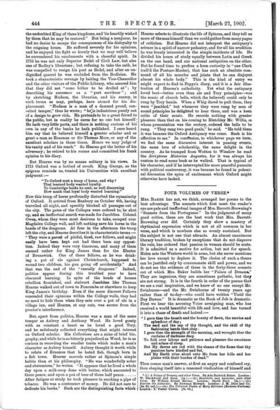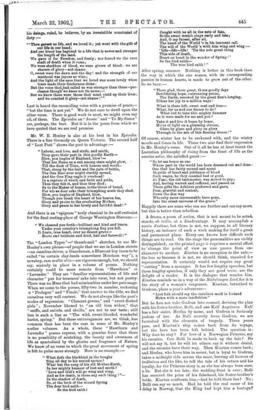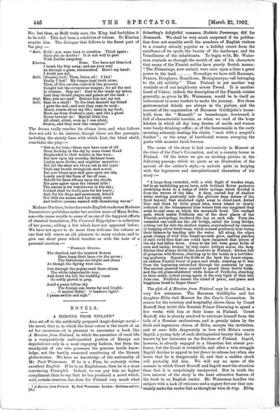FOUR VOLUMES OF VERSE.* MRS. BAKER has not, we think,
arranged her poems to the best advantage. The sonnets which first meet the reader's eye are pale and ineffectual images of Mrs. Barrett-Browning's " Sonnets from the Portuguese." In the judgment of many good critics, these are the best work that Mrs. Barrett- Browning ever did. Certainly they show a mastery of rhythmical expression which is not at all common in her verse, and which is nowhere else so evenly sustained. But the subject is not one that attracts. An almost unanimous literary tradition, broken by exceptions that do not disprove the rule, has ordered that passion in woman should be mute. It is admitted as a motive for action, but not for speech. Helen sets the Western world in arms, but she never mentions her love except to deplore it. The choice of such a theme can be justified only by consummate skill and power, and we do not see the evidence of these in the forty-three sonnets out of which Mrs. Baker builds her "Palace of Dreams."
They are ingenious, they are sometimes pathetic, but they are not strong. It is in the fourth in order of the poems that we see a real inspiration, and we know of no one except Mr.
Swinburne—and the Mr. Swinburne of twenty years ago rather than of to-day—who could have written "Until the Day Dawns." It is dramatic as the Book of Job is dramatic. First we hear the accusing Voice arraigning man, who has received a world beautiful with life and love, and has turned it into a chaos of death and hatred :—
" I gave thee the breath and the beauty of dawn, the service and splendour of day ;
The seed and the sap of thy thought, and the skill of thy fashioning hands that obey : I gave thee the strength of the morning, and wrought thee the curtains of darkness deep To fold over labour and patience and pleasure the sweetness and solace of sleep.
But My dawns are red with the shame of the flame that thy passions have kindled and fed, And My Earth cries aloud unto Me from her hills and her plains with their burden of dead."
Then comes man's answer, at first an angry and confused cry, then shaping itself into a reasoned vindication of himself and • (1.) A Palace of Dreams, and other Verse. By Ada Bartrlck Baker. London : W. Blackwood and Sons. [5s.]—(2.) Hawthorn and Lavender, with other Verse. By William Ernest Henley. London : David Nutt. [64.]—(3.) Kiartan the Icelander. By Newman Howard. London : J. M. Dent and Co. [U. 6d. neq---(4.) The Collected Poems of Mary Robinson (Madame Duetting).
London: T. Fisher Unwin. 6d.J his doings, ruled, he believes, by an irresistible constraint of duty :— "' Thou gayest us life, and we loved it ; yet went with the gift of our life in our hand; And our blood has baptised to a life that is newer and stronger the length of the land. We gave it for Freedom, and freely; nor feared we the sure shaft of death when it came; We were shedders of blood, we were givers of blood : we are sharers of glory—not shame. 0, sweet were the dawn and the day ! and the strength of our manhood was joyous as wine; And the light of the eyes that we loved was more lovely when tears made their tenderness shine : But the voice that had called us was stronger than these—per- chance thouglfwe knew not its name ;— But we knew there were those that must yield up their lives ; and we counted it glory—not shame !'" Last is heard the reconciling voice with a promise of peace,- " but the time is not yet." We do not care to dwell upon the other verse. There is good work in most, we might even say all, of them. The Epicedia on " Jessie " and " To My Sister " are, perhaps, the best. But it is in the poem from which we have quoted that we see real promise.
Mr. W. E. Henley is also at his best in his Epicedia. There is a fine threnody on Queen Victoria. The second half of " Last Post " shows the poet to advantage :- "Labour, and love, and strife, and mirth,
They gave their part in this goodly Earth—
Blow, you bugles of England, blow !- That her Name as a sun among stare might glow, Till the dusk of Time, with honour and worth : That, stung by the lust and the pain of battle, The One Race ever might starkly spread, And the One Flag eagle it overhead! In a rapture of wrath and faith and pride, Thus they felt it, and thus they died ; So to the Maker of homes, to the Giver of bread, For whc se dear sake their triumphing souls they shed, Blow, you bugles of England, blow, Though you break the heart of her beaten foe, Glory and praise to the everlasting Mother, Glory and peace to her lovely and faithful dead ! "
And there is an " epigram " truly classical in its self-restraint for the final resting-place of George Warrington Steeveus
" We cheered you forth—brilliant and kind and brave. Under your country's triumphing flag you fell. It floats, true heart, over no dearer grave—
Brave an I brilliant and kind, hail and farewell !"
The "London Types "—" thumb-nail " sketches, to use Mr. Henley's own phrase—of people that we see in London streets —an omnibus-driver, a Guardsman, a Bluecoat boy (soon to he exiled " to certain clay-lands somewhere Horsham way"), a newsboy, cum mulfis aliis—are vigorous enough, but, we should say, scarcely in place in a volume of poems. Nothing certainly could be more remote from "Hawthorn" or "Lavender." They are " familiar representations of life and character " put for terseness' sake into verse, but not poetry. There was no Muse that had mimiambics under her patronage. When we come to the poems, fifty-two in number, reckoning n " Prologue" and " Finale," that answer to the title, we find ourselves very well content. We do not always like the poet's modes of expression. " Clamant greens," and " sweet-fleshed girls " ; November likened to " an old lean widow," that " sniffs, and snivels, and shrills," are not to our taste ; still less is such a line as " The wild, sweet-blooded, wonderful harlot, spring." But these extravagances are, we think, less common than has been the case in some of Mr. Henley's earlier volumes. As a whole, these " Hawthorn and Lavender " poems express, with a genuine force that there is no possibility of mistaking, the beauty and sweetness of life as symbolised by the glories and fragrance of Nature. We know of no verse in which the great movement of spring is felt to pulse more strongly. Here is an example :— What doth the blackbird in the boughs Sing all day to his nested spouse ? What but the song of his old Mother-Earth, In her mighty humour of lust and mirth ? 'Love and God's will go wing and wing, And as for death, is there any such thing ? '— In the shadow of death, So, at the beck of the wizard Spring The dear bird saith- So the bird saith 1
CI
Caught with us all in the nets of fate, So the sweet wretch sings early and late s And, 0 my fairest, after all, The heart of the World 's in his innocent call.
The will of the World 's with hire wing and wing :- Life—life—life ! 'Tis the sole great thing This side of death, Heart on heart in the wonder of Spring !'
So the bird saith- The wise bird saith !
After spring, summer. Nothing is better in this book than the way in which the one season, with it's corresponding passion in human hearts, is made to grow out of the other. So we have :— " These glad, these great, these goodly days Bewildering hope, outrunning praise. The Earth, renewed by the great Sun's longing, Utters her joy in a million ways !
What is there left, sweet soul and true— What, for us and our dream to do ?
What but to take this mighty Summer As it were made for me and you ?
Take it and live it beam by beam. Mo'es of light on a gleaming stream, Glare by glare and glory on glory Through to the ash of this flaming dream !
Of course, winter has to be reckoned with, and the wintry moods and times in life. These two also find their expression in Mr. Henley's verse. Out of it all he has at least learnt the Lucretian philosophy of rising from the feast of life as the conviva satur, the satisfied guest :- " So let me hence as one Whose part in the world has been dreamed out and done : One that has fairly earned and spent In pride of heart and jubilance of blood Such wages, be they counted bad or good, As Time, the old taskmaster, was moved to pay ; And, having warred and suffered, and passed on Those gifts the Arbiters preferred and gave, Fear, grateful and content, Down the dim way Whereby races innumerable have gone, Into the silent universe of the grave."
Happily there are some who can see further and can say more, but this is better than rebellion.
A drama, a poem of action, that is not meant to be acted,
stands, ab initio, at a disadvantage. It may accomplish a succes d'estime, but there is not, we suppose, in all literary history, an instance of such a work making for itself a great and permanent place. Every one knows how difficult such things are to read. On the stage the personalities are visibly distinguished; on the printed page it requires a mental effort to `change the point of view as one passes from one character to another. Kiartan is no exception to the rule.—
the less so because it is not, we should think, unsuited fcr representation. It certainly would not require any great "cutting" from a manager. It has few lengthy speeches, but these lengthy speeches, if only they are good verse, are the delight of a reader. It is the dialogue that wearies him. Kiartan reminds us in a way of the Niebelungen Lied, for it is the story of a woman's vengeance. Kiartan, betrothed to Gudrun, plans a year's adventure-
" Lest folk should say the stateliest maid in Iceland Mates with a mere landlubber."
But he does not take Gudrun into counsel, devising the plan with his foster-brother, Bolli, and one Kalf Asgeirson. Kalf has a fair sister, Hrefna by name, and Gudrun is furiously jealous of her. As Bolli secretly loves Gudrun, we are furnished with the elements of tragedy. Three years pass, and Kiartan's ship comes back from its voyage, but the hero has been left behind. The question is : Why does he stay ? For love of a Norwegian Princess, say his enemies. Can Bolli be made to back up the tale ? He will not say it, but he will let others say it without denial, and the enemies have their way. Then Kiartan comes back ; and Hrefna, who loves him in secret, but is loyal to Gudrun, takes a midnight ride across the moor, braving all horrors of trollwives and the like, to tell the tale of his return and his loyalty, for the Princess story is, as she has always been sure, a lie. But she is too late; the wedding feast is over ; Belli has received the price of his falsehood, his foster-brother's bride. Kiartan confronts him,—had he told these lies ? No ; Bolli can say so much. Had he told the real cause of his delay in Norway, that the King bad kept him a hostage ? No; but then, as Bolli truly says, the King had forbidden it to be told. This bad been a condition of release. So Kiartan acquits him. The dialogue that follows is the finest part of the play :—
" Belli. Hold ! you were keen to question. Think again : Have you no doubts ? It is not well to part With doubts unspoken.
Kiartan. None. You have not blenched. I brush the blur away, and see your soul As through a glass, untarnished. Here's my hand: I doubt you not.
Boni. [Drawing back] Then, listen all ! I lied ! Foully I lied ! My tongue kept troth alone. Then, of this carcass soaked in lies preserve Nought but the scrupulous tongue; for all the rest Is vileness. Slay me ! Cast to the winds my ashes, Lest they should plague and poison all the land. Olaf. Man, you are mad ! Believe him not, my son. Bolli. Sane as a skald ! To lies that damned my friend I gave the nod ; and now they come to roost : Breed, swarm about my life ; taste in my food ; Mock me from Gudrun's eyes ; and like a ghost Hover betwixt us ! Myriad little lies, All anent, silent, even as I was silent, Swarm, and they suck like vampires."
The drama really reaches its climax here, and what follows does not add to its interest, though there are fine passages, including the stately lines with which Liot, the blind skald, concludes the play:—
"But as for him,—these eyes have seen of old
Stars flocking in the sky by some Great Hand Shepherded to their wattles in the west ; But now upon my noonday darkness beam Lights more divine, and mightier majesties : Nor till the stars are blown out in the night Shall any breath extinguish such a soul.
But you whose eyes still gaze upon our isle, Lonely amid the foam of far•off seas, Behold his fame aflame upon the clouds, His pyre aglow upon the eternal hills ! The aurora is his watchtower in the sky ; Iceland shall be God's acre for his bones ; And, for his dirge and monument, beholl Her wild sea nesses and her windy walls And hollow caverns washed with thundering waves."
Madame Duclaux, better known to English readers as Madame Darmesteter, publishes under her maiden name of Mary Robin- son—the name recalls to some of us one of the happiest efforts of classical translation, The Crowned Hippolytus—a collection of her poems, adding a few which have not appeared before. We have not space to do more than welcome the volume as one that will renew an old pleasure to many readers, and to give one short piece which touches us with the note of a
personal emotion :—
" FOREIGN SPRING.
The charlock and the hemlock flowers Have hung their laces o'er the green ;
The buttercups are bright and sheen As though the Spring were ours.
But through the poplar-rank there shines The white interminable way ; And down the hill the budding vines Go softly gloved in grey.
Amid a purer loftier sky
The foreign sun burns far and bright :
... 0 mistier fields ! 0 tenderer light! I pause awhile and sigh."












































 Previous page
Previous page